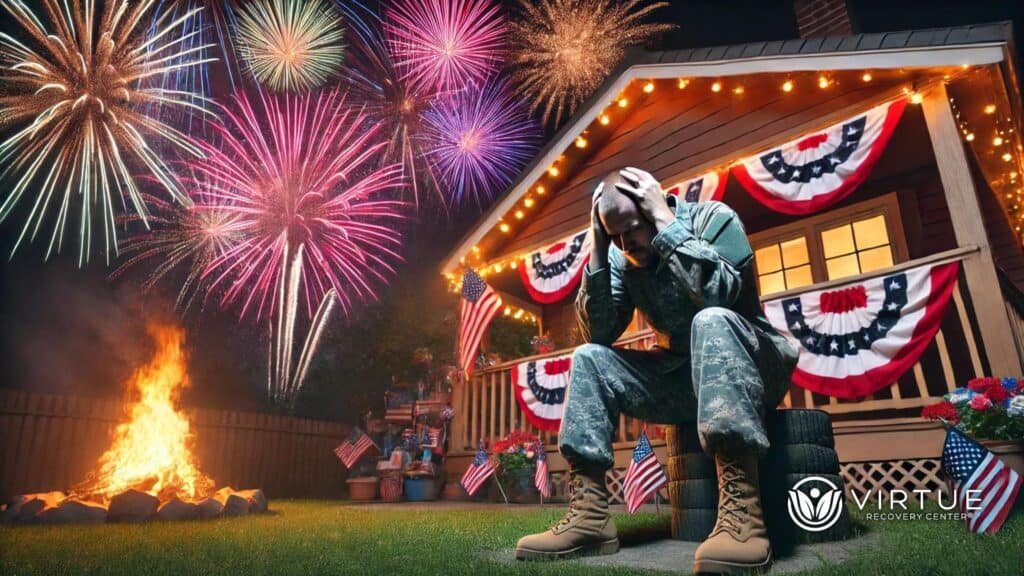Summary
Independence Day celebrations are a cherished tradition in the United States, and they are marked by fireworks and festivities. However, for those suffering from PTSD, especially veterans, these celebrations can trigger severe symptoms. This article explores how Fourth of July fireworks impact PTSD sufferers and provides practical tips to help manage these triggers. Professional support and community resources play a crucial role in supporting individuals with PTSD during Independence Day.
Key Takeaways
- Understanding PTSD – Definition and common triggers.
- Impact of Fireworks on PTSD Sufferers – How fireworks can trigger PTSD symptoms.
- Strategies to Help Manage PTSD During Independence Day – Practical tips to reduce the impact of fireworks.
- Support and Resources – Importance of professional support and resources for PTSD sufferers.
Introduction
Independence Day, also known as the Fourth of July, is celebrated with grand fireworks displays, large gatherings, and patriotic events. While these celebrations are enjoyed by many, they can be distressing for those suffering from PTSD (Post Traumatic Stress Disorder). At Virtue Recovery Center, we understand the challenges faced by PTSD sufferers and provide the necessary support to help them manage their symptoms. This article delves into the effects of Independence Day fireworks on individuals with PTSD and offers strategies to mitigate these effects.
Understanding PTSD
What is PTSD?
PTSD, or Post Traumatic Stress Disorder, is a mental health condition triggered by experiencing or witnessing a traumatic event. Common causes include combat exposure, gun violence, accidents, natural disasters, and sexual abuse. Symptoms of PTSD include flashbacks, nightmares, severe anxiety, and uncontrollable thoughts about the traumatic event.
Common Triggers for PTSD
Triggers are stimuli that cause an individual with PTSD to recall the traumatic event. Loud noises, such as those from explosions or gunfire, and large crowds are common triggers. These triggers can cause intense distress and lead to symptoms like panic attacks, hypervigilance, and emotional outbursts.
Impact of Fireworks on PTSD Sufferers
Fireworks as PTSD Triggers
The sound of fireworks can be particularly distressing for veterans with PTSD and others who suffer from the condition. The loud bangs and bright flashes can resemble the explosions and gunfire experienced during combat, causing flashbacks and heightened anxiety. The sudden and unpredictable nature of July fireworks can exacerbate these reactions, making the Fourth of July a challenging time for PTSD sufferers.
Fourth of July Celebrations
Typical Fourth of July celebrations involve fireworks displays, barbecues, and parades. While these activities are meant to be enjoyable, they can pose significant challenges for individuals with PTSD. The large crowds, loud noises, and chaotic environments can trigger severe PTSD symptoms, making it difficult for sufferers to participate in or enjoy these events.
Strategies to Help Manage PTSD During Independence Day
Preparation and Planning
Preparation is key to managing PTSD during Independence Day celebrations. Creating a quiet, safe space at home can provide a refuge from loud noises and large crowds. Using ear protection, such as noise-canceling headphones, can help muffle the sound of fireworks. Communicating with family and friends about potential triggers and planning activities that minimize exposure to fireworks can also be beneficial.
Coping Techniques
Several coping techniques can help manage PTSD symptoms during Fourth of July fireworks. Breathing techniques and mindfulness exercises can help calm the mind and reduce anxiety. Taking a cold shower can provide a grounding sensation and alleviate stress. Disturbances like watching a movie, reading, or spending time with loved ones can also help shift focus away from triggers.
Seeking Support
PTSD sufferers need to seek support from professionals and support groups. Virtue Recovery Center offers specialized programs to help individuals manage their PTSD symptoms effectively. The PTSD Coach app and other online resources can provide additional tools and strategies for coping with triggers. Connecting with others who understand the challenges of PTSD can provide comfort and reduce feelings of isolation.
Support and Resources
Professional Support
Professional treatment is essential for managing PTSD. Mental health professionals can provide therapy, medication, and coping strategies tailored to the individual’s needs. At Virtue Recovery Center, we offer comprehensive support for PTSD sufferers, helping them navigate their symptoms and improve their quality of life.
Community Resources
Various community resources are available to help veterans with PTSD and others affected by the condition. Local support groups, veteran organizations, and national helplines can provide valuable assistance and a sense of community. Utilizing these resources can make a significant difference in managing PTSD symptoms during high-stress times like Independence Day.
Conclusion
Independence Day celebrations, while enjoyable for many, can be a source of significant distress for PTSD sufferers. Understanding the impact of Fourth of July fireworks on individuals with PTSD and implementing strategies to manage these triggers is crucial. At Virtue Recovery Center, we are dedicated to providing the support needed to navigate these challenges. If you or a loved one is struggling with PTSD, call us at 866-461-3339 for assistance.
Looking for additional holiday content? Check out our article on setting New Year’s sobriety goals.
FAQs
What are the common symptoms of PTSD?
Common symptoms of PTSD include flashbacks, nightmares, severe anxiety, and uncontrollable thoughts about the traumatic event.
How can fireworks trigger PTSD symptoms?
The sound of fireworks can resemble gunfire and explosions, which can trigger flashbacks and heightened anxiety in individuals with PTSD.
What strategies can help manage PTSD during the Fourth of July?
Strategies include preparing a quiet space, using ear protection, practicing breathing techniques, and seeking professional support.
Why is professional support important for PTSD sufferers?
Professional support provides tailored therapy, medication, and coping strategies that are crucial for effectively managing PTSD symptoms.
What is it like living with someone with PTSD?
Living with someone with PTSD can be challenging as they may experience flashbacks, anxiety, and emotional outbursts. It requires patience, understanding, and creating a supportive environment to help them feel safe and understood. Communication and empathy are crucial in managing daily interactions and providing the necessary support.
How do you calm down when triggered by PTSD?
To calm down when triggered by PTSD, it’s essential to practice grounding techniques such as deep breathing, focusing on the present, or using sensory items to stay anchored. Seeking a quiet, safe space and reaching out to a trusted friend or therapist can also help manage and reduce the intensity of the trigger.
Why are fireworks bad for mental health?
Fireworks can be detrimental to mental health, especially for individuals with PTSD, as the loud noises and sudden flashes can trigger traumatic memories and anxiety. The unpredictable nature of fireworks can cause heightened stress and panic, making it difficult for some individuals to feel safe and secure.
What resources are available for veterans with PTSD?
Resources include local support groups, veteran organizations, national helplines, and specialized programs like those offered by Virtue Recovery Center.
Resources
https://www.med.upenn.edu/mfc/2021-independence-day-fireworks-gun-violence-survivors-ptsd.html



























